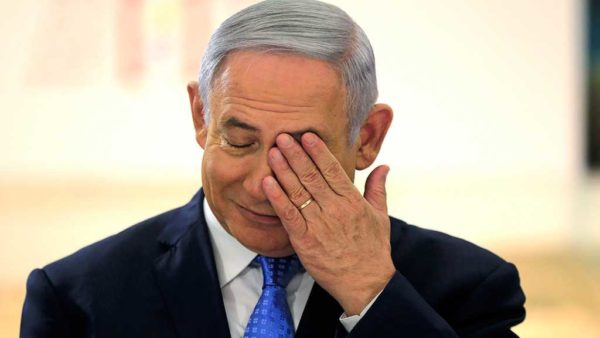 Gantz’s Kahol Lavan has one-seat lead over Netanyahu’s Likud ■ Arab party comes in third ■ Netanyahu crony admits intimidation campaign against Arabs ‘blew up in our face’
Gantz’s Kahol Lavan has one-seat lead over Netanyahu’s Likud ■ Arab party comes in third ■ Netanyahu crony admits intimidation campaign against Arabs ‘blew up in our face’
Benny Gantz’s Kahol Lavan is ahead of Prime Minister Benjamin Netanyahu’s Likud Party, official election results released on Wednesday after 90 percent of the votewere counted indicate. The results show that neither parties have a clear path to securing majority in Knesset, Israeli Daily Haaretz reported
According to the partial results, Kahol Lavan won 32 out of 120 Knesset seats, with Likud behind with 31 seats. Netanyahu’s bloc, comprised of right-wing and ultra-Orthodox parties, currently stands at 55 seats. The center-left bloc has 56 seats.
Avigdor Lieberman, whose Yisrael Beiteinu party is projected nine seats, is expected to be the election’s kingmaker. On Wednesday morning, he reiterated his support for a “broad liberal unity government,” which would include Yisrael Beiteinu, Likud and Kahol Lavan.
The third largest party in the Knesset is the Joint List of Arab parties, with 13 seats. It is followed by ultra-Orthodox party Shas, which gets nine seats and United Torah Judaism, which gets eight seats. Ayelet Shaked’s Yamina gets seven seats, the results indicate, Labor-Gesher get six and Democratic Union get five seats.
After a crude and thuggish campaign, in which he trampled the election laws alongside his son, who attacked every government institution, it looks as though Prime Minister Benjamin Netanyahu is closer than ever to losing power. Avigdor Lieberman, on the other hand, who repeated his pre-election promises, will probably be the key person in the next Knesset.
Likud lawmaker and Netanyahu loyalist Miki Zohar said his party was damaged by its failed attempt to pass a law allowing parties to film voters in polling stations, “out of belief that there is voter fraud in polling stations in Arab towns.”
“Without a doubt, the cameras campaign came back at us like a boomerang,” Zohar said, adding that Joint List leaders took advantage of the campaign, seen as an attempt to intimidate voters, and capitalized on it to increase Arab voter turnout.
Ayman Odeh: I want to be leader of the opposition
Joint List Chairman Ayman Odeh said that he is interested in being the leader of the Knesset opposition, including “attending security briefings.”
Odeh acknowledged that he spoke on the phone with Kahol Lavan leader Benny Gantz on Tuesday night, but added that their conversation was “nothing new… He didn’t mention me [in his speech] and I think it’s on purpose. It’s the result of a decade of de-legitimizing [Arabs] in politics.”
In a scenario of a unity government consisting of Likud and Kahol Lavan, Ayman Odeh would be the leader of the largest party not in government, possibly becoming the first Arab leader of the opposition in Israel’s history.
Gantz calls for ‘a good and desirable unity government’
Kahol Lavan Chairman Benny Gantz said he is awaiting the final election results and in the meantime, “wishes Israel a good and desirable unity government” – referring to the possibility of a ruling coalition comprised of his party and Netanyahu’s Likud.
Yisrael Beiteinu Chairman Avigdor Lieberman commented on the election results Wednesday morning, saying: “The picture is clear… There is only one option and it’s a broad liberal unity government,” referring to a scenario in which a coalition is composed of Yisrael Beiteinu and rival leading parties Likud and Kahol Lavan.
Lieberman said he will not join any other coalition. “We will not sit with the Arab party [Joint List], that’s absurd.” He added that his condition for negotiations is a commitment to draft ultra-Orthodox yeshiva students to the Israeli military – an issue that led to the repeat election in the first place, when Netanyahu failed to bridge between Yisrael Beiteinu and ultra-Orthodox parties in building a right-wing, Haredi coalition.

Leave a Reply
You must be logged in to post a comment.